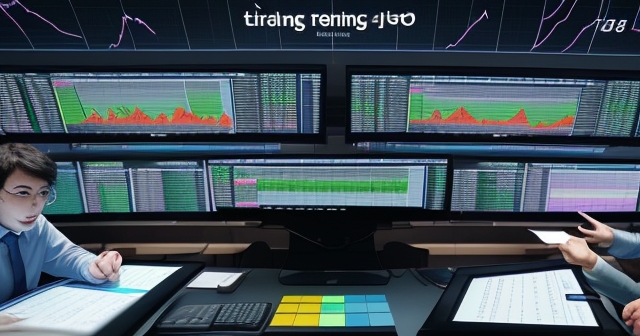Welcome, aspiring market participants and curious minds, to a deep dive into a fascinating corner of the financial world: proprietary trading firms and the unique career paths they offer. Perhaps you’ve honed your understanding of technical analysis, mastered charting patterns, or delved into quantitative methods, and now you’re wondering where these skills can lead you professionally beyond traditional routes like investment banking or asset management. Proprietary trading, often shortened to “prop trading,” presents a distinct and potentially highly rewarding avenue.
In this guide, we’ll explore what proprietary trading firms are, the roles you might find within them, how they differ from hedge funds and banks, and what it takes to build a successful career in this dynamic environment. Think of us as your navigators through this complex landscape, breaking down sophisticated concepts with clarity and precision. We aim to equip you with the knowledge to understand if a prop trading job aligns with your aspirations and skills.
Here are three key reasons to consider a career in proprietary trading:
- The opportunity to work with sophisticated trading strategies and technologies.
- The potential for high earnings tied directly to your trading performance.
- The chance to collaborate with a talented team in a fast-paced environment.
At its heart, proprietary trading is about trading a firm’s own capital rather than client money. Unlike asset managers who manage funds for external investors or brokers who execute trades on behalf of clients, prop firms are essentially trading houses betting their own balance sheet in the markets. Their goal is straightforward: to generate profits directly through trading activities.
This model gives prop firms a unique structure and focus. They are highly sensitive to market fluctuations and rely heavily on sophisticated strategies, cutting-edge technology, and skilled personnel to gain an edge. The success of the firm is directly tied to the profitability of its traders and quantitative strategists.
However, it’s crucial to distinguish between different types of firms that might call themselves “prop firms.” Some operate on less legitimate models, potentially charging high fees for access to platforms without providing real training or capital. The focus of this discussion, and indeed the high-value career opportunities, lies with legitimate proprietary trading firms. These firms offer a stable base salary, employee benefits, rigorous training programs, and access to substantial firm capital, fostering a collaborative team environment dedicated to long-term profitability and professional growth.
These legitimate firms often focus on specific market segments or trading styles. Many specialize in market-making, profiting from the bid-ask spread by providing liquidity or exploiting small, temporary inefficiencies in pricing across different markets or instruments. They use a combination of human expertise and sophisticated algorithmic strategies to execute trades rapidly and efficiently.

A legitimate prop trading firm is a complex ecosystem requiring diverse talents. While “trader” is the most commonly associated role, it’s far from the only one, and even within trading, there are different specializations. Understanding these roles is essential for determining where your skills and interests might fit.
The primary career paths typically fall into three main categories:
- Traders: These are the individuals who make the buy and sell decisions and manage positions. Trading roles themselves can be highly varied.
- Discretionary Traders: While less common in highly automated prop firms, some roles still involve human judgment and analysis of market conditions, news events, and technical patterns to make trading decisions. They react to real-time information and evolving market narratives.
- Quantitative Traders: These traders rely heavily on statistical models and algorithms to identify trading opportunities and execute trades. They often work closely with quantitative researchers and developers. Their decisions are data-driven and systematic.
- Hybrid Traders: Many roles blend quantitative analysis with discretionary oversight. Human traders monitor automated systems, step in during unusual market events, or adapt strategies based on insights not yet incorporated into algorithms. The human element is crucial for navigating unforeseen circumstances.
Traders are responsible for managing risk, monitoring positions, and contributing directly to the firm’s profit and loss (P&L). They need sharp analytical skills, discipline, the ability to make rapid decisions under pressure, and a deep understanding of market mechanics and specific instruments like futures, forex, or equities.
- Quantitative Researchers (Quants): These are the architects of the firm’s trading strategies. Quants design, develop, and test mathematical models and statistical algorithms aimed at predicting market movements, identifying arbitrage opportunities, or implementing complex trading strategies.
- They typically have advanced degrees in highly quantitative fields such as mathematics, physics, computer science, statistics, or engineering.
- Their work involves analyzing vast datasets, conducting rigorous backtesting, and continuously refining models to maintain an edge in ever-changing markets.
- A deep understanding of probability, statistics, time series analysis, and machine learning is fundamental to this role.
Quant Researchers are critical for the firm’s long-term profitability, constantly seeking new alpha-generating strategies.
- Developers and Engineers: These professionals are the builders and maintainers of the firm’s technological infrastructure. Given the reliance on high-speed, algorithmic trading, the technology stack is paramount.
- Trading System Developers: They build and optimize the trading platforms, order execution systems, risk management tools, and data pipelines. This often involves working with low-latency programming languages like C++ or Java, and understanding network protocols and system architecture.
- Quantitative Developers/Engineers: These developers implement the models created by quant researchers into live trading systems. They need a strong understanding of both programming and the mathematical/statistical concepts behind the strategies.
- Infrastructure Engineers: They manage the hardware, networks, and data centers that are critical for high-frequency trading operations. This can include specialized hardware like FPGAs (Field-Programmable Gate Arrays) for ultra-low latency execution.
Developers and engineers provide the technological backbone that enables the trading and research functions to operate effectively and competitively.

While distinct, these roles are highly collaborative. Traders provide feedback on strategy performance, Quants refine models based on market data and trader insights, and Developers ensure that the strategies can be executed reliably and efficiently. This teamwork is a hallmark of successful legitimate prop firms.
Understanding the required skillset and background for prop trading jobs is vital if you’re considering this path. What kind of candidates are these firms looking for, and how does their recruitment philosophy compare to other financial institutions?
Here’s where we see significant differences, particularly when comparing prop firms to systematic hedge funds and large banks:
Systematic Hedge Funds: The Academic Elite
Systematic hedge funds, which rely purely on quantitative models for trading, are known for being highly selective, particularly for their Quant Researcher roles. They often have a strong preference, even a strict requirement, for candidates with PhDs from top-tier universities in highly quantitative fields. We’ve seen how systematic hedge funds are very academically snobby, and won’t touch anyone that doesn’t have a PhD from a top 50 university for its quant researcher roles, interviewing thousands but hiring few. Their environment is geared towards deep, theoretical research and complex model development.
Large Banks: Structured Quant Roles
Large banks, particularly within their sales and trading divisions, also hire quants. They have been hoovering up PhDs over the last 5-10 years for quantitative roles. The compensation structure here often includes a solid base pay, perhaps giving $150k to $200k to fresh PhD graduates as base pay, though with zero upside compared to hedge funds where bonuses can exceed $1m within a few years. Bank quant roles can be very quantitative, but may also involve more regulatory work, client-facing analysis, or support for traditional trading desks.
Legitimate Prop Trading Firms: Adaptability and Practicality
Legitimate prop trading firms often have a different perspective, especially for pure trading roles. While quantitative skills are increasingly important, they are less interested in PhDs for these roles and will sometimes actively discriminate against them, finding them too academic, preferring candidates with strong Bachelor/Master degrees who are dead keen and adaptable. These firms often have proprietary training programs designed to mold promising candidates into their specific trading methodologies. They value candidates who are quick learners, resilient, possess strong problem-solving skills, work well in a team, and have a pragmatic approach to markets.
However, for Quantitative Developer and engineering roles, prop firms do value advanced degrees, mirroring the banks and hedge funds. For quantitative developers and engineers implementing models or building high-performance systems, computer science PhDs are better than undergraduates, and the most success is usually had with PhD quant developers. In specialized areas like FPGA development for ultra-low latency trading, almost all engineers at top firms have PhDs.
In summary, while advanced degrees are highly valued for research and technical roles across the board, legitimate prop firms, for trading positions, prioritize trainability, adaptability, a passion for the markets, and a collaborative mindset often found in strong Bachelor’s or Master’s graduates. They are looking for individuals they can integrate into their specific trading desks and methodologies.
One of the major draws of prop trading jobs is the potential for high earnings, directly tied to performance. However, the structure of compensation and career progression differs significantly from traditional finance roles.
| Aspect | Prop Firms | Banks |
|---|---|---|
| Compensation Structure | Base salary + profit share | Base salary + bonuses |
| Profit Sharing | Higher % of profits | Lower % of profits |
| Career Progression | Meritocratic based on performance | Often hierarchical |
At a legitimate prop firm, compensation typically includes a base salary plus a bonus or profit-sharing component. Unlike some less reputable models that rely solely on traders funding accounts and taking a high percentage of profits (but with little support), legitimate firms provide a stable income base and significant resources.
The profit-sharing model is key to the upside potential. While firms must cover their own costs and retain capital, they share a portion of the profits generated by the trader or trading desk. We’ve seen examples like Maverick Trading, where prop trading jobs allow you to trade with firm capital, keeping 70-80% of the profits you generate. This is considerably higher than typical bonus structures in banks or even the portion of fund profits allocated to individual portfolio managers in many hedge funds (after management and performance fees are taken out). For example, at Maverick Trading, profitable traders can earn over $20K+ per month after the first year, with potential for $100,000+/year as Elite Traders who receive higher capital allocations and greater profit share.
Contrast this with the bank compensation structure mentioned earlier. While the base salary for a fresh PhD quant might be $150k-$200k, the bonus potential is limited, offering zero upside compared to hedge funds where bonuses can exceed $1m within a few years. Prop firms offer a blend: a reasonable base salary for stability, plus significant performance-based upside via profit share or bonuses.

Career progression in prop trading is often meritocratic. Success is measured by your consistent profitability and risk management. As you demonstrate skill and generate consistent P&L, firms are typically willing to increase your capital allocation, allowing you to trade larger positions and thus earn higher potential profits. This direct relationship between performance and earning potential is a major motivator for prop traders.
Furthermore, many legitimate prop firms invest heavily in training. They understand that their competitive edge comes from the skills of their people. This training can be extensive, covering market fundamentals, trading psychology, risk management techniques, and the firm’s specific trading strategies and technology platforms. This focus on continuous learning and skill development is a significant benefit for those looking to grow in their career.
To fully appreciate the nature of prop trading jobs, it’s useful to draw clearer distinctions between prop firms, hedge funds, and large banks (specifically their sales & trading or markets divisions). While all operate in financial markets, their fundamental business models create vastly different environments, job roles, and career paths.
| Aspect | Prop Firms | Hedge Funds | Banks |
|---|---|---|---|
| Capital Source | Firm’s own capital | External investor capital | Bank’s own and client capital |
| Regulation | Less regulated | Moderately regulated | Heavily regulated |
| Work Environment | Meritocratic, fast-paced | Collaborative, varied | Structured, bureaucratic |
Understanding these differences is crucial when considering a career. Do you thrive in a fast-paced, performance-driven, less bureaucratic environment with direct impact on the bottom line? Or do you prefer the structure, broad scope, and potentially more stable, though less explosive, earning potential of a large bank? Prop trading offers a distinct alternative for those whose skills and personality align with its unique demands.
How does one actually land a job at a legitimate proprietary trading firm? The recruiting process can be rigorous, designed to identify candidates with the specific blend of analytical skills, market intuition (for trading roles), technical prowess, and cultural fit that these firms seek.
Legitimate prop firms recruit from various sources. They often have strong relationships with universities, targeting students with strong quantitative backgrounds for both trading and technical roles. They also actively seek experienced professionals, poaching talented traders or quants from competitors, hedge funds, or banks. Networking within the financial industry can also open doors.

The application process typically involves several stages:
- Initial Application: Submitting a resume and cover letter highlighting relevant skills, academic achievements, and any prior trading experience or projects.
- Online Assessments: Many firms use quantitative and logical reasoning tests to screen candidates. These might assess your math skills, probability knowledge, pattern recognition, and ability to think logically under pressure.
- Interviews: This can range from initial phone screenings to multiple rounds of interviews, including technical interviews (testing quantitative or programming knowledge), behavioral interviews (assessing teamwork, resilience, and cultural fit), and sometimes market-based interviews (discussing your understanding of current events, specific markets, or technical analysis concepts). Some firms like Maverick Trading have a multi-step process involving videos, profiles, and several interview stages.
- Trading Simulations or Case Studies: For trading roles, candidates might be given hypothetical trading scenarios or access to a simulated trading platform to assess their decision-making under pressure, risk management instincts, and ability to learn and adapt.
- Background Checks: Standard for the financial industry.
What do recruiters look for? Beyond the technical requirements for each role (quantitative skills for quants, programming for developers, market knowledge for traders), they assess your passion for the markets, your resilience in the face of losses (which are inevitable in trading), your ability to learn quickly, and how well you would integrate into their team-oriented culture. They want candidates who are not only smart but also humble enough to learn and collaborative enough to work effectively with others.
For those just starting out, demonstrating a strong interest in markets, perhaps through personal trading experience (even with small amounts or simulators), participation in trading clubs, or completing relevant online courses and projects, can significantly strengthen your application. Building a strong foundation in mathematics, statistics, and programming is invaluable regardless of the specific role you target.
You might wonder about the impact of automation on prop trading jobs. With the rise of algorithmic and high-frequency trading, is there still a place for human traders?
The answer is unequivocally yes, although the nature of the roles is changing. While a lot of trading is automated, particularly in high-frequency and market-making strategies, human expertise remains crucial. Automation changes the focus from manual order entry and execution to designing, managing, and monitoring the algorithms themselves. Human traders still need to tweak algorithms based on changing market conditions, manage unexpected events (like flash crashes or major news announcements that models aren’t programmed to handle), and exercise judgment in situations algorithms can’t fully process.
Moreover, developing *new* strategies and identifying *new* market inefficiencies often requires human creativity, intuition, and deep market understanding that precedes the automation phase. Quant Researchers design the models, Developers build the systems, but experienced Traders often provide invaluable insights into market structure and behavior that inform the development of profitable algorithms.

So, while the landscape is increasingly technical, the need for human talent persists in different forms. Traders are evolving into managers of automated systems, focusing more on strategy oversight, risk management, and adapting to novel market dynamics. Quants are pushing the boundaries of data science and machine learning to find new edges. Developers are building faster, more robust, and more intelligent trading systems.
This evolution underscores the need for continuous learning and adaptability for anyone entering the prop trading world. You must be comfortable working with technology and data, even in primarily trading-focused roles.
Looking at specific firms and recent market news helps ground our discussion in reality. While we’ve used Maverick Trading as an example for its structure and remote work options, the prop trading world is diverse. Firms specialize in different asset classes (equities, futures, options, forex, commodities, crypto assets) and different trading frequencies (high-frequency, medium-frequency, low-frequency/position trading).
Examples of firms or activities that highlight the current landscape include: Blue Guardian Futures Launches Instant Funding, showing innovation in funding models for futures traders; PropFirmPlus Weekly Market Recap & Outlook, indicating a focus on ongoing market analysis and trader support; and TradeDay, Tradeify are futures prop firms, demonstrating specialization in specific derivatives markets. These examples show a dynamic industry with ongoing activity and specific offerings for traders.
| Firm Example | Specialization |
|---|---|
| Maverick Trading | Equities and options with flexible work |
| Blue Guardian Futures | Futures trading with innovative funding |
| TradeDay | Focus on futures |
For traders interested in global markets, including foreign exchange, understanding the platforms used is also key. When choosing a trading platform, the flexibility and technical advantages of a platform like Moneta Markets are worth noting. It supports major platforms such as MT4, MT5, and Pro Trader, combining high-speed execution with low spread settings to provide a good trading experience. This highlights the importance of technology and platform choice in facilitating trading across various instruments like forex.
The industry is constantly adapting to regulatory changes, technological advancements, and shifts in market structure. Staying informed about these developments is part of being a successful professional in this field.
It’s impossible to discuss prop trading without addressing the inherent risk and volatility. Trading with significant capital means the potential for substantial profits is accompanied by the potential for significant losses. Legitimate prop firms place a huge emphasis on risk management – it’s not just a function, it’s part of the culture.
Firms employ sophisticated risk management systems and protocols to monitor positions, limit potential losses, and ensure that no single trade or strategy can jeopardize the firm’s survival. Traders are typically given strict risk limits that they must adhere to. Learning to manage risk effectively is as crucial as developing profitable strategies. It requires discipline, emotional control, and a deep understanding of market dynamics.
For individuals considering this path, it means accepting that losing days or even losing streaks are part of the job. Resilience and the ability to analyze losses objectively to learn from them, rather than being emotionally derailed, are critical personality traits for a prop trader. The focus is on long-term, consistent profitability rather than hitting home runs every day.
The compensation structure, heavily weighted towards performance, also means income can be variable, especially early in your career. While base salaries provide stability, the significant upside comes from profits, which are never guaranteed. This requires a different financial mindset compared to a traditional salary-plus-fixed-bonus role.
If a career in proprietary trading sounds appealing, what steps can you take to build the necessary foundation? Regardless of whether you aim for a trading, research, or development role, certain core skills are highly valued.
- Quantitative Proficiency: A strong background in mathematics, statistics, probability, and data analysis is almost universally required, especially for quant and development roles, but increasingly important for traders too. Take challenging math and statistics courses.
- Programming Skills: Proficiency in languages like Python (for data analysis and strategy development), C++ (for performance-critical systems), or Java is highly beneficial. Build projects that demonstrate your ability to work with data or develop algorithms.
- Market Knowledge: Develop a deep understanding of how financial markets work, the different asset classes, technical analysis, fundamental drivers, and market microstructure. Read financial news, follow market commentators, and ideally, get some hands-on experience.
- Technical Analysis & Trading Strategy Basics: Even if you aim for a quant role, understanding trading concepts is useful. For trading roles, a solid grasp of technical analysis tools, chart patterns, and basic trading strategies is a good starting point, though prop firms will train you in their specific methods.
- Risk Management: Learn the principles of risk management. Understand concepts like position sizing, stop losses, leverage, and how to measure and mitigate different types of market risk.
- Problem-Solving and Adaptability: Markets are constantly changing. You need to be able to analyze problems, think critically, and adapt your approach quickly.
- Psychological Discipline: Trading is mentally demanding. Practice emotional regulation, patience, and discipline. Simulated trading can help develop these skills without financial risk.
- Teamwork and Communication: Prop firms are collaborative. Being able to communicate clearly, share ideas, and work effectively in a team is important.
Consider pursuing relevant academic degrees (Computer Science, Math, Physics, Engineering, Finance, Economics with a quantitative focus). Gain practical experience through internships, personal projects, or participation in trading competitions. Continuously educate yourself, as the markets and the technology used to trade them are always evolving.
Proprietary trading offers a challenging, fast-paced, and potentially highly lucrative career path for individuals with the right skills and mindset. It’s a world where performance is paramount, learning is continuous, and the rewards for success can be substantial.
Compared to traditional roles in hedge funds or banks, prop trading often provides a more direct link between your efforts and financial outcomes, greater potential for high profit share, and a focus on specific, often technologically driven, trading strategies. It demands resilience, analytical rigor, technological fluency, and a deep-seated passion for the financial markets.
Whether you aspire to be a trader, a quant researcher, or a developer building the systems of tomorrow, legitimate prop firms offer significant opportunities to utilize sophisticated technology, access substantial capital, and work alongside talented professionals in a meritocratic environment.
If you are a beginner investor or someone with a keen interest in technical analysis and market mechanics looking for a professional path that leverages these skills in a highly competitive arena, exploring proprietary trading jobs could be an excellent next step in your career journey. Research firms, understand their specializations, build your foundational skills, and prepare for a rigorous, but potentially very rewarding, path.
prop firm jobsFAQ
Q:What are proprietary trading firms?
A:Proprietary trading firms use their own capital to trade financial instruments for profit, rather than trading client funds.
Q:What roles are available at prop firms?
A:Common roles include traders, quantitative researchers (quants), and developers or engineers.
Q:How do compensation structures work in prop trading?
A:Compensation typically includes a base salary plus profit-sharing, linking earnings directly to trading performance.
